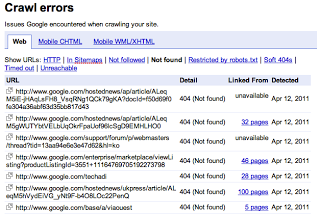วันจันทร์ที่ 2 พฤษภาคม 2011
คุณกำลังใช้เครื่องมือของผู้ดูแลเว็บเพื่อดูว่าเว็บไซต์คุณเจ๋งแค่ไหน... แต่เดี๋ยวนะ ทำไมหน้าข้อผิดพลาดจากการ Crawl เต็มไปด้วยข้อผิดพลาด 404 (Not found)!
เกิดอะไรขึ้นกับเว็บไซต์ของฉันเนี่ย

ไม่ต้องตกใจไป มาดูกันว่าข้อผิดพลาด 404 มี (หรือไม่มี) ผลกระทบต่อเว็บไซต์ของคุณอย่างไร
ถาม: ข้อผิดพลาด 404 ที่รายงานในเครื่องมือของผู้ดูแลเว็บมีผลต่อการจัดอันดับเว็บไซต์ของฉันไหม
ตอบ: ข้อผิดพลาด 404 เป็นเรื่องปกติในเว็บ อินเทอร์เน็ตมีการเปลี่ยนแปลงอยู่ตลอดเวลา มีเนื้อหาเกิดใหม่ เนื้อหาเก่าจะตายไป และเมื่อไม่มีเนื้อหา ตามหลักการแล้วก็จะส่งโค้ด HTTP 404 ตอบกลับมา เครื่องมือค้นหารู้ดีถึงเรื่องนี้ เราเองก็มีข้อผิดพลาด 404 ในเว็บไซต์ของเรา อย่างที่คุณเห็นด้านบน และทั่วทั้งเว็บ ที่จริงแล้วเราอยากให้เป็นแบบนั้น เมื่อลบหน้าในเว็บไซต์ คุณต้องทำให้หน้านั้นแสดงโค้ดตอบกลับ 404 หรือ 410 (ไม่ควรใช้ soft
404) โปรดทราบว่าหากจะให้ Crawler ของเราเห็นโค้ดตอบกลับ HTTP ของ URL, Crawler จะต้องทำการ Crawl URL นั้นได้ หากคุณให้ไฟล์ robots.txt บล็อก URL ดังกล่าว เราจะทำการ Crawl ไม่ได้ และจะไม่เห็นโค้ดตอบกลับ การที่ URL บางรายการในเว็บไซต์ไม่มีแล้ว หรือแสดงข้อผิดพลาด 404 จะไม่ส่งผลต่อ URL อื่นๆ ของเว็บไซต์ (URL ที่แสดงผลรหัสสถานะ 200 (Success)) ในผลการค้นหาของเรา
ถาม: ข้อผิดพลาด 404 ไม่เป็นอันตรายต่อเว็บไซต์ของฉันเลยใช่ไหม
ตอบ: หาก URL บางรายการในเว็บไซต์ของคุณเป็น 404 แค่เรื่องนี้จะไม่มีผลต่อคุณหรือในผลการค้นหาของ Google อย่างไรก็ตาม อาจมีเหตุผลอื่นๆ ที่คุณต้องแก้ไขข้อผิดพลาด 404 บางประเภท เช่น หากหน้าเว็บบางหน้าที่เป็น 404 เป็นหน้าเว็บที่คุณเป็นห่วงจริงๆ ก็ควรดูสาเหตุที่เราพบข้อผิดพลาด 404 เมื่อทำการ Crawl หากคุณเห็นการสะกดคําผิดของ URL ที่ยังใช้อยู่ (เช่น www.example.com/awsome แทนที่จะเป็น www.example.com/awesome) อาจเป็นไปได้ว่ามีคนเจตนาจะลิงก์ไปยังคุณและแกล้งพิมพ์ผิด แทนที่จะแสดง 404 คุณอาจทำการเปลี่ยนเส้นทาง 301 URL ที่สะกดผิดไปยัง URL ที่ถูกต้องและดูเจตนาการเข้าชมจากลิงก์นั้น นอกจากนี้ คุณยังควรช่วยผู้ใช้ไปที่หน้า 404 ในเว็บไซต์ ให้ผู้ใช้พบสิ่งที่ต้องการได้ แทนที่จะแค่บอกว่า "404 ไม่พบ"
ถาม: อยากทราบข้อมูลเพิ่มเติมเกี่ยวกับ "ข้อผิดพลาด soft 404"
ตอบ: soft 404 จะแสดงเมื่อเว็บเซิร์ฟเวอร์ส่งโค้ดตอบกลับที่ไม่ใช่ 404 (หรือ 410) สําหรับ URL ที่ไม่มีอยู่ ตัวอย่างที่พบได้บ่อยคือเจ้าของเว็บไซต์ต้องการแสดงหน้า 404 พร้อมข้อมูลที่เป็นประโยชน์สําหรับผู้ใช้ และคิดว่าถ้าเว็บไซต์จะแสดงเนื้อหาแก่ผู้ใช้ ก็ต้องส่งโค้ดตอบกลับ 200 แต่ไม่ใช่อย่างนั้น คุณใช้โค้ดตอบกลับ 404 ได้ และขณะเดียวกันก็แสดงเนื้อหาที่ต้องการได้ด้วย อีกตัวอย่างหนึ่งคือเมื่อเว็บไซต์เปลี่ยนเส้นทาง URL ที่ไม่รู้จักไปยังหน้าแรกแทนที่จะแสดงข้อผิดพลาด 404 ทั้งสองกรณีนี้จะส่งผลเสียต่อความเข้าใจและการจัดทําดัชนีเว็บไซต์ ดังนั้นเราขอแนะนําให้ตรวจสอบว่าเซิร์ฟเวอร์ของคุณแสดงโค้ดตอบกลับที่เหมาะสมสําหรับเนื้อหาที่ไม่มีอยู่จริง โปรดทราบว่าแค่หน้าเว็บบอกว่า "404 ไม่พบ" อาจไม่ได้หมายความว่ามีการส่งโค้ดตอบกลับ HTTP 404 จริงๆ ให้คุณใช้ฟีเจอร์โปรแกรม Googlebot จําลอง ในเครื่องมือของผู้ดูแลเว็บเพื่อตรวจสอบให้แน่นอนอีกครั้ง หากไม่ทราบว่าจะกําหนดค่าเซิร์ฟเวอร์ให้แสดงรหัสตอบกลับที่เหมาะสมอย่างไร โปรดดูเอกสารประกอบความช่วยเหลือของโฮสต์เว็บของคุณ
ถาม: ฉันจะทราบได้อย่างไรว่า URL ควรเป็น 404 หรือ 301 หรือ 410
ตอบ: เมื่อคุณนำหน้าออกจากเว็บไซต์ ให้คิดว่าจะมีการย้ายเนื้อหาไปไว้ที่อื่นไหม หรือคุณไม่คิดจะมีเนื้อหาประเภทนี้ในเว็บไซต์อีกต่อไป หากคุณจะย้ายเนื้อหานั้นไปยัง URL ใหม่ คุณควรใช้การเปลี่ยนเส้นทาง 301 URL เก่าไปยัง URL ใหม่ ซึ่งจะทําให้ระบบเปลี่ยนเส้นทางผู้ใช้ที่เข้ามายัง URL เก่าเพื่อค้นหาเนื้อหาดังกล่าวไปยังหน้าที่เกี่ยวข้องกับสิ่งที่ผู้ใช้กําลังค้นหาโดยอัตโนมัติ หากคุณจะทิ้งเนื้อหาดังกล่าวไปเลยและไม่มีเนื้อหาอื่นบนเว็บไซต์ที่จะตอบความต้องการเดียวกันนี้ให้แก่ผู้ใช้ได้ เช่นนั้น URL เก่าก็ควรแสดงผล 404 หรือ 410 ปัจจุบัน Google จะถือว่า 410 (Gone) เหมือนกับ 404 (Not found) จึงไม่สําคัญเลยว่าคุณจะส่งอย่างไหนกลับมา
ถาม: ข้อผิดพลาด 404 ส่วนใหญ่ของฉันเป็น URL แปลกๆ ที่ไม่เคยมีอยู่ในเว็บไซต์
เกิดอะไรขึ้น URL พวกนี้มาจากไหน
ตอบ: หาก Google พบลิงก์ที่ไหนสักแห่งในเว็บที่ชี้ไปยัง URL ในโดเมนของคุณ Google อาจพยายามทำการ Crawl ลิงก์นั้นไม่ว่าจะมีเนื้อหาอยู่จริงหรือไม่ก็ตาม และเมื่อ Google ทำการ Crawl, เซิร์ฟเวอร์ของคุณก็ควรแสดง 404 หากไม่พบอะไร ลิงก์เหล่านี้อาจเกิดขึ้นจากการพิมพ์ผิดเมื่อมีคนลิงก์ไปหาคุณ การกําหนดค่าบางประเภทไม่ถูกต้อง (หากลิงก์สร้างขึ้นโดยอัตโนมัติโดย CMS) หรือความพยายามของ Google ที่จะรู้จักคุณและทําการ Crawl ลิงก์ที่ฝังใน JavaScript หรือเนื้อหาที่ฝังไว้อื่นๆ หรืออาจเป็นส่วนหนึ่งของการตรวจสอบอย่างรวดเร็วจากฝั่งเราเองเพื่อดูว่าเซิร์ฟเวอร์ของคุณจัดการ URL ที่ไม่รู้จักอย่างไร เหล่านี้เป็นต้น หากคุณเห็นข้อผิดพลาด 404 รายงานอยู่ในเครื่องมือของผู้ดูแลเว็บสําหรับ URL ที่ไม่มีอยู่ในเว็บไซต์ คุณไม่ต้องสนใจ URL เหล่านั้นก็ได้ เราไม่รู้ว่า URL ใดมีความสําคัญสําหรับคุณ กับไม่รู้ว่า URL ใดที่ควรจะแสดง 404 ดังนั้น เราจึงแสดงข้อผิดพลาด 404 ทั้งหมดที่พบในเว็บไซต์ของคุณ และให้คุณเป็นคนตัดสินใจว่า URL รายการใด (หากมี) ที่ควรต้องตรวจสอบ
ถาม: มีคนคัดลอกเนื้อหาเว็บไซต์ของฉันและทําให้เกิดข้อผิดพลาด 404 จํานวนมาก URL เหล่านี้เป็น URL "จริง" ทั้งหมดที่มีโค้ดอื่นๆ ติดอยู่ เช่น https://www.example.com/images/kittens.jpg" width="100" height="300" alt="kittens"/> กรณีนี้จะส่งผลกระทบต่อเว็บไซต์ของฉันไหม
ตอบ: โดยทั่วไป คุณไม่ต้องกังวลเลยว่า "ลิงก์เสีย" อย่างนี้จะส่งผลเสียต่อเว็บไซต์ เราเข้าใจว่าเจ้าของเว็บไซต์ควบคุมอะไรได้น้อยมากสำหรับพวกที่คัดลอกเนื้อหาเว็บไซต์ หรือพวกที่ลิงก์เนื้อหาด้วยวิธีการแปลกๆ หากคุณเชี่ยวชาญเรื่อง regex ก็อาจลองใช้การเปลี่ยนเส้นทาง URL เหล่านี้ แต่โดยทั่วไปแล้วไม่มีอะไรต้องกังวล นอกจากนี้ คุณสามารถส่งคําขอให้ลบออกได้เมื่อเชื่อว่ามีคนขโมยเนื้อหาต้นฉบับจากเว็บไซต์ของคุณ
ถาม: สัปดาห์ที่ผ่านมาฉันแก้ไขข้อผิดพลาด 404 ทั้งหมดที่ Search Console รายงาน แต่ข้อผิดพลาดเหล่านั้นยังคงอยู่ในบัญชี นี่หมายความว่าฉันไม่ได้แก้ไขอย่างถูกต้องใช่ไหม ต้องใช้เวลานานเท่าใดกว่าที่ข้อผิดพลาดดังกล่าวจะหายไป
ตอบ: ดูคอลัมน์ "ตรวจพบ" ในหน้าข้อผิดพลาดจากการ Crawl ซึ่งเป็นวันที่ล่าสุดที่เราตรวจพบข้อผิดพลาดแต่ละรายการ หากวันที่ในคอลัมน์เป็นวันที่ก่อนที่คุณจะแก้ไขข้อผิดพลาด แสดงว่าเราไม่พบข้อผิดพลาดเหล่านี้ตั้งแต่วันที่ดังกล่าว หากเป็นวันที่หลังจากนั้น แสดงว่าเรายังคงพบข้อผิดพลาด 404 เหล่านี้อยู่เมื่อทำการ Crawl
หลังจากแก้ไขแล้ว คุณสามารถตรวจสอบได้ว่า Crawler ของเราเห็นโค้ดตอบกลับใหม่หรือไม่โดยใช้โปรแกรม Googlebot จําลอง ทำการทดสอบ 2-3 URL หากเห็นว่าถูกต้องแล้ว ข้อผิดพลาดเหล่านี้ควรจะเริ่มหายไปจากรายการข้อผิดพลาดจากการ Crawl
ถาม: ฉันจะใช้เครื่องมือนํา URL ออกของ Google เพื่อทําให้ข้อผิดพลาด 404 หายไปจากบัญชีของฉันได้เร็วขึ้นไหม
ตอบ: ไม่ เครื่องมือนํา URL ออกจะนํา URL ออกจากผลการค้นหาของ Google ไม่ใช่จากเครื่องมือของผู้ดูแลเว็บ ซึ่งออกแบบมาสําหรับคําขอนําออกแบบเร่งด่วนเท่านั้น และไม่จําเป็นต้องใช้หาก URL แสดง 404 อยู่แล้ว เพราะ URL ดังกล่าวจะหายไปจากผลการค้นหาอยู่แล้วเมื่อเวลาผ่านไป ดูรายละเอียดเพิ่มเติมเกี่ยวกับสิ่งที่เครื่องมือนํา URL ออกทําได้และทำไม่ได้ที่ครึ่งล่างของบล็อกโพสต์นี้
หากยังต้องการทราบข้อมูลเพิ่มเติมเกี่ยวกับข้อผิดพลาด 404 โปรดไปที่สัปดาห์ 404 จากบล็อก หรือไปที่ฟอรัมความช่วยเหลือสำหรับผู้ดูแลเว็บ
